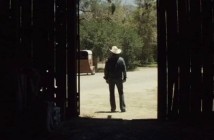I didn’t use to think it was terribly controversial to advocate seeing a movie more than once to gain a better understanding of what it does, how it does what it does, why it does what it does, and whether it is successful in any or all of these aspects. And so, after seeing The Master for the first time and being left mostly confused, feeling only mildly compelled and surprisingly unengaged emotionally, there was no hesitation in my decision to see it a second time as soon as possible. The subsequent second viewing was revelatory.
It’s enough to make me think that I kind of suck at watching movies the first time around—this has been such a common occurrence for me, not grasping the greatness of acclaimed movies until a second or sometimes third viewing, that I don’t think I’m nearly as trusting of my first impression of a film as someone like Pauline Kael or, more recently, Stephanie Zacharek would tend to be. Kael was of course famous for never seeing a movie more than once because she always “got it the first time.” If only we were all so brilliant!
This is of course, to borrow from Joe Biden, malarkey. It’s actually remarkably arrogant malarkey, even if this standard was only applied to those kinds of skillful mystery movies that foreshadow their conclusions with subtle hints along the way. Even the most simple of this type of movie would require a superhuman ability for recall to fully assess the consistency between the eventual outcome and the long setup. For more complex movies that feature far more for the viewer to consider than merely plot details, the claim that a person can “get it” (whatever that even means) based on one sitting is a proudly ignorant assertion. It’s akin to basing an assessment of another person entirely on your first impression of them, or for that matter, simply never amending your initial opinion on any issue, no matter what new information is presented to you. This doesn’t seem like the attitude of a person interested in taking a movie seriously.
 Then again, as Zacharek asks in her essay, when should a movie be taken seriously in the first place? We all decide on some level the degree to which we treat any movie we watch with designated seriousness; it’s inevitable that we don’t view Dredd in the same way as The Master or even Argo. This is largely due to the context in which a film exists. Much of this context falls under the umbrella term of “genre,” but extends beyond to questions of commercial hype, filmmaker reputation, critical and/or award recognition, and more. All of these factor into how a movie is received the first time it’s seen (and this is all without even measuring the environment, mood, and company in which a person watches, which can be absolutely critical).
Then again, as Zacharek asks in her essay, when should a movie be taken seriously in the first place? We all decide on some level the degree to which we treat any movie we watch with designated seriousness; it’s inevitable that we don’t view Dredd in the same way as The Master or even Argo. This is largely due to the context in which a film exists. Much of this context falls under the umbrella term of “genre,” but extends beyond to questions of commercial hype, filmmaker reputation, critical and/or award recognition, and more. All of these factor into how a movie is received the first time it’s seen (and this is all without even measuring the environment, mood, and company in which a person watches, which can be absolutely critical).
It doesn’t matter whether people are willing to admit it or not: expectations play an enormous role in the eventual response to actually seeing a film for the first time. Misleading promotional material or just details overheard or glanced at in a blog post often leave audiences waiting for a movie they were expecting to see, when in fact the movie before them is something else entirely. What’s even trickier about this relationship between expectations and reality is that there are incidents in which the surprise is pleasing, or the fulfillment of wishes is reached, or conversely, when a movie is deemed predictable or the achieved outcome is simply disappointing (because you were hoping for something else). It’s territory that veers into the arbitrary.
Much of the pleasure of movies is in this element of surprise. Nothing quite matches the experience of watching Memento or Eternal Sunshine of the Spotless Mind and genuinely not knowing where it will lead. These are special occurrences. This is also not meant to diminish the power of that first viewing, a film’s ability to conjure emotions or ideas or impressions immediately in the viewer, or perhaps to trick and treat an audience with some visual or narrative magic. These positive responses can be checked for shallowness in subsequent viewings of a film, but initial delight is most certainly an end in its own right. Such pleasures can be rare, after all.
Rather, I favour the second and third viewing as a way of examining the movie as much as examining ourselves, the viewer. What was I expecting, anyway? What was I hoping for? What was the movie trying to do, exactly? What are other people seeing that I’m not? It’s this diligence that, for me, separates the serious viewer seeking the strongest cinematic opinion possible from the uncurious worshipper of certainty who meets contrasting opinions and merely turns away, muttering “screw ‘em.”
 For the most recent example of why I try to defer, just in the interest of open-mindedness, to critical and public opinion of movies that just didn’t do it for me the first time, I’d like to relate some of my thoughts on The Master.
For the most recent example of why I try to defer, just in the interest of open-mindedness, to critical and public opinion of movies that just didn’t do it for me the first time, I’d like to relate some of my thoughts on The Master.
As I stated earlier, my first impression of the film consisted of what I’m sure are the most basic consensus assessments: Joaquin Phoenix is amazing, the relationship between his character and the one portrayed by Philip Seymour Hoffman is a creepy father-son situation, it has something to do with Scientology, and there’s a lot of water and waves and stuff. Revealingly, aside from the water, these were all elements introduced to me prior to even seeing the movie; in particular the Scientology aspect interested me simply out of my own personal intrigue with that religious movement, and this undoubtedly tinged my perception throughout this entire first viewing. I think deep down I was waiting for something that never materialized, as is often the case in a film experience anticipated to this extent.
Essentially, this was a necessary part of the process to strip away all these unfair expectations and inaccurate assumptions, and being conscious of this, upon reassurance from countless fans of the film that it is indeed worthy of the patience required to screen it a second time, I did some reading, some thinking, and then saw the movie again a few days later. The point I’m trying to get across is that there are times when this sort of effort and time truly pays off, because as I also said before, my second attempt delivered the goods. And oh, what goods! Now when I think back on the film, I don’t think about the hopes I had for my entire year of grad school where I was studying to do a paper on Scientology and Hollywood that this film would be somehow informative and relevant to my own work. The constant questioning of whether the film lives up to the standard Paul Thomas Anderson set with There Will Be Blood has ceased. I can appreciate the film on its own terms, in its own universe and context, rather than one made up for it by my wandering mind.
Two motifs jumped out at me in this second viewing. The first, with an assist from the Filmspotting podcast which drew my attention to the various liquids imbibed and expelled in the film, was water as a source of power. The second theme running throughout that I found particularly interesting was the means of manipulation exercised by characters seeking dominance over one another. The moment everything clicked for me was when I connected these two aspects, focusing on the manipulation of liquids and the quest for power especially by Lancaster Dodd but to a seemingly less successful degree by Freddie Quell and others. The opening shot of the entire movie, which gets shown a couple more times throughout, features the vastness of the sea and the waves caused by the manipulation of this body by human innovation in the form of a boat—humankind exercising a dominance of sorts over nature. Freddie demonstrates a certain dominance through his ability to ingest the most potent poisons, which in turn translates into a physical dominance he uses to keep doubters in line with startling violence. Dodd not only can handle Freddie’s fluids (and for a time, Freddie himself) but is in control of his own, which he displays in the prison cell by punctuating his verbal belittling of Freddie with a triumphant piss—also indicating, through the fact that his toilet remains intact unlike Freddie’s, that he can control his emotions. Peggy, however, reminds Dodd of her own ability to control him by forcing an expulsion of a different kind of fluid from his processing unit (asserting herself as Master of his domain, if you will).
 The fluid metaphor then extends out to all exercises of control and manipulation used by characters of The Master. The pervading sense, however, for me at least, is that the film is meant to show that true freedom is entirely a mythic concept. The closing scene spells out fairly frankly the notion that anyone who believes they aren’t following a master of some kind is fooling themselves. At the same time we are both masters and slaves to the things in our lives; just when we think we’ve gained power over something, and are free from its control, it can come to completely consume us. Freddie can stomach his booze physically but it ultimately dictates his actions. He can overpower dissidents physically but this only results in being disciplined by his father figure, Dodd. He is able to seduce women but is left impotent or asleep at the restaurant. Similarly, Dodd likes to use silliness and music to maintain his control of people’s attention and affection. He is unable, however, to escape the law that ends up sending him to prison, to remain consistent in his appeal to reason when challenged and instead resort to outbursts, and to ultimately reform Freddie. He is, in the end, left unsatisfied in Freddie’s commitment to The Cause, and this is a sign of the failure of his philosophy. The waves made in the water dissipate before too long.
The fluid metaphor then extends out to all exercises of control and manipulation used by characters of The Master. The pervading sense, however, for me at least, is that the film is meant to show that true freedom is entirely a mythic concept. The closing scene spells out fairly frankly the notion that anyone who believes they aren’t following a master of some kind is fooling themselves. At the same time we are both masters and slaves to the things in our lives; just when we think we’ve gained power over something, and are free from its control, it can come to completely consume us. Freddie can stomach his booze physically but it ultimately dictates his actions. He can overpower dissidents physically but this only results in being disciplined by his father figure, Dodd. He is able to seduce women but is left impotent or asleep at the restaurant. Similarly, Dodd likes to use silliness and music to maintain his control of people’s attention and affection. He is unable, however, to escape the law that ends up sending him to prison, to remain consistent in his appeal to reason when challenged and instead resort to outbursts, and to ultimately reform Freddie. He is, in the end, left unsatisfied in Freddie’s commitment to The Cause, and this is a sign of the failure of his philosophy. The waves made in the water dissipate before too long.
There are numerous elements to the film that require further exploration and unpacking: the pervasiveness of blue and what that colour could represent in different instances, especially in contrast to other colours, such as the vibrant red Dodd is wearing upon our first meeting; the bizarre sexual encounters including the aforementioned Dodd family bathroom meeting as well as Freddie’s relationship with the sand woman; the juxtaposition of humour used by Dodd and Freddie, Dodd’s being largely goofy but successful and Freddie tending to take his juvenile humour way too far; commentary on religion and the extent to which community, belonging and power take precedence over actual belief; and of course, so many others. By the second viewing, I felt that joyous feeling that art can confer upon a person, the feeling that you understand each aspect perfectly but attempts to put these impressions to words are hopeless.
This is but one of many more examples of this type of moviegoing experience than I would normally care to admit. My hope in sharing such experience is that perhaps others can relate to the admission that one go-round on a rich film didn’t connect but further patience with it paid off. Or maybe most other people really do fully grasp the meaning of a smart film the first time every time. If that’s the case, all I can do is simply yield to those masters.



